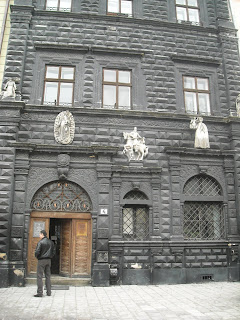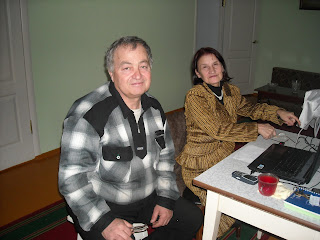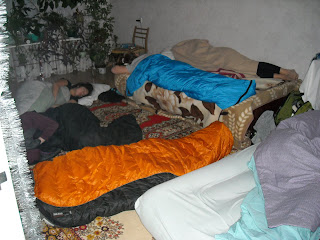
Neshet and Serdar having a good time in Kyiv.

On the train to L'viv (before the heat got turned on!).

Building across from our hostel, a typical sight in the old center of L'viv.

City center.

On the hill overlooking the city.

Heading down from the top.

Booksellers are out no matter the weather.


We begin our walk in the snowy cemetery.

The kitchen of our hostel and two American hostel mates.

A stormy night in Crimea, glad to be huddled up in my warm little house—finally warm after returning yesterday morning from being gone for a week to find the temperature in my house 8 degrees Centigrade. It took almost 24 hours for it to warm back up to a reasonable temperature, which makes me not want to turn off the heat when I am gone in the winter, but I know how expensive the gas is here, so I think I can live with a little discomfort.
Last week was an “adventure vacation” with Neshet and Serdar. Serdar and I had talked about going to the western Ukraine city of L’viv during his winter break (which is just one week and is the only break he gets all year!) and when asking Neshet’s permission to go, it was clear he wanted to go too. Somehow, it was important that I ask him, which I did, so the trip turned into a threesome. I so wish Lenura and Safie could have gone too, but Safie was back in school and Lenura had to work. With tears in our eyes, we said that next time just the two (or three) of us would do a trip together.
I needed to go to Kyiv for a day to finish some Peace Corps business, so the plan was to take an overnight train to Kyiv, spend the day there, and then take an overnight train to L’viv and spend two days there, and finally taking the train back to Simferopol, a 24-hour trip. I usually travel 3rd class on the trains because it is cheaper, but Neshet wasn’t too crazy about that idea. So we compromised by traveling 3rd class on the two overnighters and then 2nd class on the long train back to Simferopol. The difference between 2nd and 3rd class is that in 2nd class you are in a closed compartment of four people, and there is more privacy and less people in the train car. But unless you get one of the new train cars, 2nd class isn’t all that much better than 3rd class. In either class, the bathrooms especially have a lot to be desired. But with three of us, it was fun having a compartment to ourselves. The real problem with all the trains in the winter is that they are so hot. There doesn’t seem to be any way to regulate the heat, so we spent a lot of time sweating while watching the snow covered fields go by.
We got to Kyiv early in the morning. Serdar and his dad took off to explore the center, while I went to the Peace Corps office to finish up my last grant and then to the optical store to order a new pair of glasses. I met them around noon in the center, and we spent several more hours walking around, taking some pictures, having something to eat at a cheap cafeteria I knew about. The weather wasn’t great—sort of a cold grey drizzly day—but we enjoyed ourselves anyhow. Serdar had been to Kyiv with me last summer and knew his way around pretty well, and I think was proud to show his dad different sights. Neshet had only been to Kyiv once before, about ten years ago to join protests about the Crimean Tatar reparations. So he hadn’t exactly “seen the sights,” and I think enjoyed visiting the city again.
We took a late afternoon train to L’viv, arriving early in the morning. This train was less crowded and a little less hot, but our area of the car suffered from the lack of light (the bulbs were burned out and hadn’t been replaced) and also the fact that it was right next to the door into the corridor where the bathroom was. So much of the night there was a banging of the door, but I mostly managed to sleep through it.
We took a tram from the train station to our hostel, located in the heart of the city center. L’viv is an expensive city and I knew people who had stayed in this hostel, so it seemed like a reasonable choice for Serdar and me. However, when Neshet decided to come too, I wondered about it. I asked Serdar if he thought his dad would be okay staying in a “dormitory” hostel, and he said yes, but I probably should have known better. He turned out to be very uncomfortable in the hostel and mostly wanted to not spend any time there. And, for him, it wasn’t hard to see why. The hostel is a large, old converted apartment owned by an Australian. There are several rooms which sleep four to twelve people. We were in the ten-bed room, but we were the only three people in it. This is the off season, and though the hostel can accommodate forty people, there were only a total of nine guests while we were there. A large kitchen was the hang out area where you can end up talking to people from all over the world—the real appeal of hostel traveling. But this time there were only Americans and one German. The hostel caters to English speakers and is decorated with Red Army memorabilia, something Westerners would find interesting. But, of course, Neshet is not a westerner. He grew up in the Soviet Union, served in the Red Army, and speaks no English. Furthermore, though he never travels, his idea of traveling is definitely not hostel style. I don’t think we really could have afforded any hotel in the L’viv city center, but whatever we could have found, it might have been a better choice for us. It was a real sort of cross cultural learning experience for me in how I need to think more about the ways my life is so different from someone like Neshet’s and how that impacts even relatively simple things like choices in traveling accommodations.
But despite the less than desirable living arrangement, the three of us had a nice time exploring the wonderful old historic city of L’viv. The weather continued to be cold and gloomy, and the second day, there was such a thick wet snow, that I ended up buying an umbrella to try to stay dry. We walked around the historic district, climbed to the top of a hill where there are the remnants of an ancient fort and great views of the city; climbed again to the top of a bell tower also with great views; went to a “weapons” museum (which Neshet and Serdar found interesting and I found appalling—a history of man’s quest to kill one another); watched the ice skaters on a rink in the center and wanted to go but there were no rental skates available (that would have been interesting—neither Neshet or Serdar have ever ice skated); and walked in the falling snow through a famous old cemetery where the Ukrainian writer Ivan Franko is buried among other luminaries. In between our walking around we found cafes to get out of the weather and warm up and a cafeteria down the street from the hostel provided food that fit our budget. The 24-hour train ride back home was long, but we had the compartment to ourselves and spent the time playing cards, sleeping, reading, talking, and watching the snow covered forests passing by. Serdar and I joked around a lot and also had some great conversations about life in America and about my life in particular, which made me feel even closer to him.
It’s Monday morning now, and I am back at the library, and once again, wondering about exactly what is going on around me. Everyone seems to be working on future ideas for the library, but I can’t really follow all the conversations. I will continue to do the work I know best here—English teaching, blog writing, grant writing—and am fairly content with that, but I will keep searching for other opportunities for different projects. Sometimes I think the Peace Corps is just about keeping busy. It’s hard to imagine what a difference it would make if I could understand the language, but I have become more accepting of working within these limitations.
Back to my work, such as it is. Love to all from Crimea.









